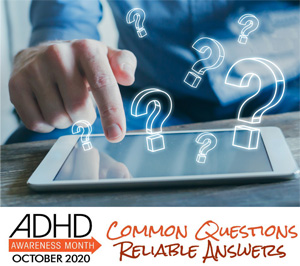Finding reliable information about ADHD can be challenging. Many websites and publications offer resources on the disorder, ranging from information that is accurate and trustworthy to sources with false and even harmful statements.
During this year’s ADHD Awareness Month, the coalition of CHADD, ADDA, and ACO is presenting the most common questions about ADHD with reliable answers from noted experts. On the ADHD Awareness website and the coalition’s social media—Twitter, Facebook, and Instagram—new questions are posted daily. Questions from the previous days are grouped by topic for readers to explore further.
Leading experts answer ADHD questions
More than 30 experts from around the world have taken on tough questions about ADHD. The coalition asked researchers on ADHD in women and men, workplace accommodations, treatment and lifestyle support, education, and many other fields to offer answers to commonly asked questions.
Among those offering answers are:
Russell A. Barkley, PhD:
Question: What is the relationship between ADHD and emotional regulation?
Answer: ADHD is associated with an elevated risk for various mood and anxiety disorders beyond just impulsive emotions. However, the emotional disturbances in ADHD are just that—emotions: short duration, provoked, and often situation specific. Understanding the role of emotional impulsiveness (EI) and deficient emotional self-regulation (DESR) would help differentiate frequent social interaction problems and impairments of ADHD from mood disorders. Read the full answer.
Ari Tuckman, PsyD, CST
Question: What does a comprehensive treatment plan for adults with ADHD look like/include?
Answer: ADHD in adults is best managed with a combination of medication, learning about ADHD, therapy and/or coaching. We need to address both the brain wiring and also the psychological impact of living with ADHD. Read the full answer.
Margaret H. Sibley, PhD
Question: What are the risk factors for people with ADHD during the coronavirus pandemic?
Answer: The biggest concerns for adolescents and young adults with ADHD during COVID-19 are social isolation, motivation problems, and difficulties engaging in online work or schooling. These risk factors create a perfect storm for the onset of depression, school dropout, or work underperformance. Read the full answer.
Readers can check each day for a new question. Upcoming questions address adult ADHD issues, healthy eating, common relationship issues, school accommodations, and coaching.
CHADD’s commitment to evidence-based ADHD information
CHADD is the home of the National Resource Center on ADHD, a cooperative project between CHADD and the US Centers for Disease Control and Prevention. The NRC enables CHADD to provide evidence- and science-based information on ADHD. Its telephone helpline is available Monday through Friday, from 1-5 pm ET to answer questions about ADHD and help callers find resources local to them. The helpline can be reached at 866-200-8098.
“ADHD Awareness Month highlights topics that often come up when discussing ADHD,” says CHADD CEO Robert Cattoi. “CHADD has the experts to review the science and provide easy-to-understand descriptions for parents, adults, teachers, and other caregivers. This month emphasizes the need for not just awareness, but also the need to act on the awareness and seek diagnosis and treatment. While there is no cure for ADHD, it is treatable at every age.”
Annual International Conference on ADHD
As part of ongoing efforts to raise awareness and provide accurate information, CHADD, ADDA, and ACO are hosting the first virtual Annual International Conference on ADHD from November 5–7. Registration for this fully online event is now open.
This year’s theme is “Strong Minds, Healthy Lives,” inspired by the cooperation of CHADD, ADDA, and ACO in supporting the ADHD community through their various publications, local affiliate groups, and online programming.
The largest ADHD conference in the world, the event offers more than 60 sessions, along with online break-out groups and keynote addresses by experts John Ratey, MD, Kathleen Nadeau, PhD, and entertainer Sinbad.
Other highlights include:
- General sessions featuring speakers on a wide variety of topics, research symposia, opportunities to connect with friends new and old, new peer support meet-ups, and a virtual talent show.
- An opportunity to meet and experience coaching through “speed dating.”
- Author chats with some of the presenters during the conference.
- The virtual exhibit hall, a new experience for conference-goers. Attendees will be able to download information and set up meeting with the exhibitors.
Learn more about ADHD Awareness:
- ADHD Awareness Month
- CHADD’s ADHD Awareness Month—Plan A Virtual Walk
- October Is ADHD Awareness Month: Why That’s Important
- Support for you: ADHD Awareness at the Local Level
- ADHD: Don’t Like the Name?
- What Everyone Should Know About ADHD
Join the discussion: How are you helping to build ADHD awareness in your community?

